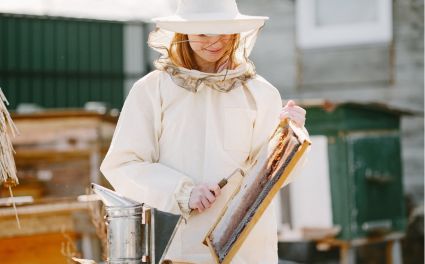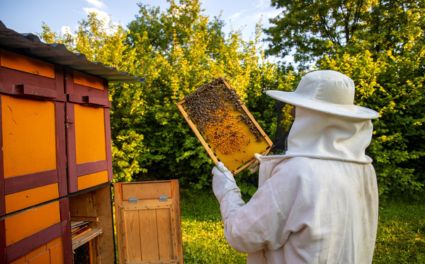Bees are small creatures with an extraordinary impact. While often overlooked, they are essential to the balance of nature, agriculture, biodiversity, and human life. Beyond producing honey, bees are vital pollinators—supporting food production, maintaining ecosystems, and influencing the global economy.
Despite their size, their role in preserving life on Earth is massive. In this article, we’ll explore the ecological, economic, and environmental importance of bees, along with the threats they face and what we can do to protect them.
🌱 Ecological Importance
Role in Agriculture
Bees play a central role in agriculture by pollinating crops. As bees travel from flower to flower to collect nectar and pollen, they facilitate plant reproduction. This process supports the growth of fruits, vegetables, nuts, and other essential crops.
Their work directly boosts crop yields and improves the quality of produce, making bees critical for global food security and agricultural economies.
Biodiversity and Ecosystem Health
Bees don't just help farms—they sustain wild plant populations, too. By pollinating various plants, bees maintain genetic diversity and keep ecosystems balanced and resilient. This biodiversity strengthens our environment, making it more adaptable to climate change and other challenges.

🔄 Bees and the Food Chain
Supporting Other Species
Bees’ pollination efforts lead to the production of seeds, fruits, and nuts that many animals—such as birds, rodents, and mammals—rely on for food. This shows how bees are a cornerstone of the food web, supporting many other species.
Balancing Ecosystems
By influencing plant diversity, bees help prevent any one species from dominating. Their activity maintains balance in natural ecosystems and supports a rich variety of life.
💰 Economic Importance
Crop Pollination Value
Bees contribute billions to the global economy by pollinating commercial crops. Without bees, farmers would face lower yields, reduced quality, and higher food prices.
Boosting Quality and Productivity
Pollinated plants are more likely to produce larger, healthier fruits and seeds. This means better harvests and higher market value—thanks to bees.
To support your hives effectively, explore quality Beekeeping Equipments made to improve pollination and hive management.
🍯 Honey & Bee Products
Honey for Human Use
Honey is not only delicious—it also has natural antibacterial and anti-inflammatory properties. Used in food, skincare, and medicine, it’s one of the most valuable bee by-products.
Economic Value of the Honey Industry
The global honey industry supports thousands of jobs. Beekeepers harvest and sell honey along with other bee products, contributing to both local and international economies.
Other High-Value Products
-
Beeswax: Used in candles, cosmetics, and pharmaceuticals.
-
Royal Jelly, Propolis & Bee Venom: Used in health supplements and traditional medicine.
These products offer extra income opportunities for beekeepers and benefit various industries.
🌾 Environmental Contributions
Bee-Friendly Farming
Adopting bee-friendly practices—like planting wildflowers, avoiding harmful pesticides, and rotating crops—can greatly improve bee health in agricultural zones.
Preserving Wild Habitats
Natural landscapes such as forests, grasslands, and meadows offer bees a variety of plants, nesting areas, and safe environments. Protecting these areas is essential to maintaining healthy bee populations.
🧭 Bees as Environmental Indicators
Sensitivity to Change
Bees are excellent indicator species. They’re highly sensitive to environmental changes like pollution, habitat degradation, and pesticide use. A decline in bee populations often signals a deeper ecological problem.
Ecosystem Monitoring
Scientists monitor bee health and behavior to track ecosystem conditions. Bee decline can indicate larger threats such as climate change or toxic pesticide levels.
Want to contribute to pollinator protection? Learn Beekeeping and make an impact from your backyard or farm.
⚠️ Threats to Bee Populations
Pesticide Exposure
Pesticides—especially neonicotinoids—harm bees by damaging their ability to forage, reproduce, and resist disease. These chemicals are a leading cause of Colony Collapse Disorder (CCD).
Colony Collapse Disorder (CCD)
CCD occurs when worker bees abandon the hive, leaving behind the queen and brood. It is a complex issue caused by pesticide exposure, pathogens, and environmental stress—and it threatens global food supply systems.
🌆 Habitat Loss & Climate Stress
Urbanization and Agriculture
As cities expand and farmlands become more intensive, bees lose vital nesting grounds and foraging areas. Removing wild hedgerows and native plants makes it harder for bees to survive.
Deforestation
In tropical regions, deforestation strips bees of essential floral sources and disrupts pollination cycles.
Climate Change Effects
Unpredictable seasons, earlier flower blooms, and extreme weather can throw off the bee-plant relationship. Bees may miss their window to forage, leading to food shortages and reduced colony health.
🛠️ Conservation Efforts
Organic and Sustainable Farming
Organic farms avoid harmful chemicals and provide diverse flowering plants year-round. This encourages pollinator activity and strengthens biodiversity.
Bee-Friendly Gardens
Urban dwellers can support bees by planting wildflowers and avoiding pesticides. Small gardens with native plants provide vital food and nesting for local bee populations.
Interested in beekeeping? Protect yourself with beekeeping jackets, beekeeping suits, and beekeeping gloves.
Kids joining you? Explore beekeeping kids suits and fun options like pink bee Suits.
Also consider essentials like beekeeping veils, beekeeping trousers, and beekeeping ankle protection.

📋 Regulations and Education
Sustainable Beekeeping Practices
Beekeeping guidelines promote hive health, environmental care, and ethical honey harvesting. These standards ensure that beekeeping remains beneficial for both bees and humans.
Disease Prevention
Regular hive inspections, cleanliness, and early treatment of issues like Varroa mites are key to maintaining healthy bee colonies.
Raising Public Awareness
Education is essential. Community programs, social media, and school workshops can help people understand bees’ roles and encourage conservation.
Stay updated—read more blogs about beekeeping and learn how you can support bee health.
🌍 Final Thoughts
Bees are not just honey producers—they are vital contributors to life as we know it. From agriculture to biodiversity, from medicine to climate resilience, bees support a network of life that touches every human on the planet.
As bee populations face increasing threats, it's time for all of us—farmers, gardeners, consumers, and educators—to act. Whether you plant a flower, keep a hive, or avoid pesticides, your choices matter.
OZ Armour offers top-tier gear for beekeepers across the US, UK, EU, and Australia to support this vital work safely and sustainably.
Let’s protect the pollinators that help our planet bloom. 🌸🐝



